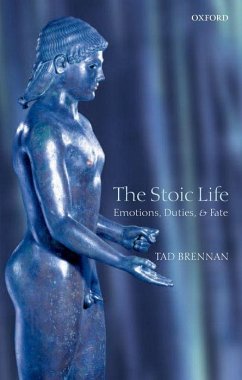Tad Brennan explains how to live the Stoic life - and why we might want to. Stoicism has been one of the main currents of thought in Western civilization for two thousand years: Brennan offers a fascinating guide through the ethical ideas of the original Stoic philosophers, and shows how valuable these ideas remain today, both intellectually and in practice. He writes in a lively informal style which will bring Stoicism to life for readers who are new to ancient
philosophy. The Stoic Life will also be of great interest to philosophers and classicists seeking a full understanding of the intellectual legacy of the Stoics.
Brennan starts from scrupulous attention to the evidence (references are provided to all of the standard collections of Stoic texts). He provides translations of the original texts, with extensive annotations that will allow readers to pursue further reading. No knowledge of Greek is required. An introductory section provides context by introducing the reader to the most important figures in the Stoic school, the philosophical climate in which they worked, and a brief summary of the leading
tenets of the Stoic system. After this context is established, the book is divided into three sections. The first provides a thorough exploration of the Stoic school's theories of psychology, focusing on their analyses of fear, desire, and other emotions. The second develops the more centrally
ethical topics of value, obligation, and right action. The third part explores the Stoic school's views on fate, determinism, and moral responsibility.
For anyone interested in the origins of Western ethical thought, who wishes to understand the vast influence that Stoic philosophy has had on philosophy and religion up to our time, this book will be essential reading.
Hinweis: Dieser Artikel kann nur an eine deutsche Lieferadresse ausgeliefert werden.
philosophy. The Stoic Life will also be of great interest to philosophers and classicists seeking a full understanding of the intellectual legacy of the Stoics.
Brennan starts from scrupulous attention to the evidence (references are provided to all of the standard collections of Stoic texts). He provides translations of the original texts, with extensive annotations that will allow readers to pursue further reading. No knowledge of Greek is required. An introductory section provides context by introducing the reader to the most important figures in the Stoic school, the philosophical climate in which they worked, and a brief summary of the leading
tenets of the Stoic system. After this context is established, the book is divided into three sections. The first provides a thorough exploration of the Stoic school's theories of psychology, focusing on their analyses of fear, desire, and other emotions. The second develops the more centrally
ethical topics of value, obligation, and right action. The third part explores the Stoic school's views on fate, determinism, and moral responsibility.
For anyone interested in the origins of Western ethical thought, who wishes to understand the vast influence that Stoic philosophy has had on philosophy and religion up to our time, this book will be essential reading.
Hinweis: Dieser Artikel kann nur an eine deutsche Lieferadresse ausgeliefert werden.








